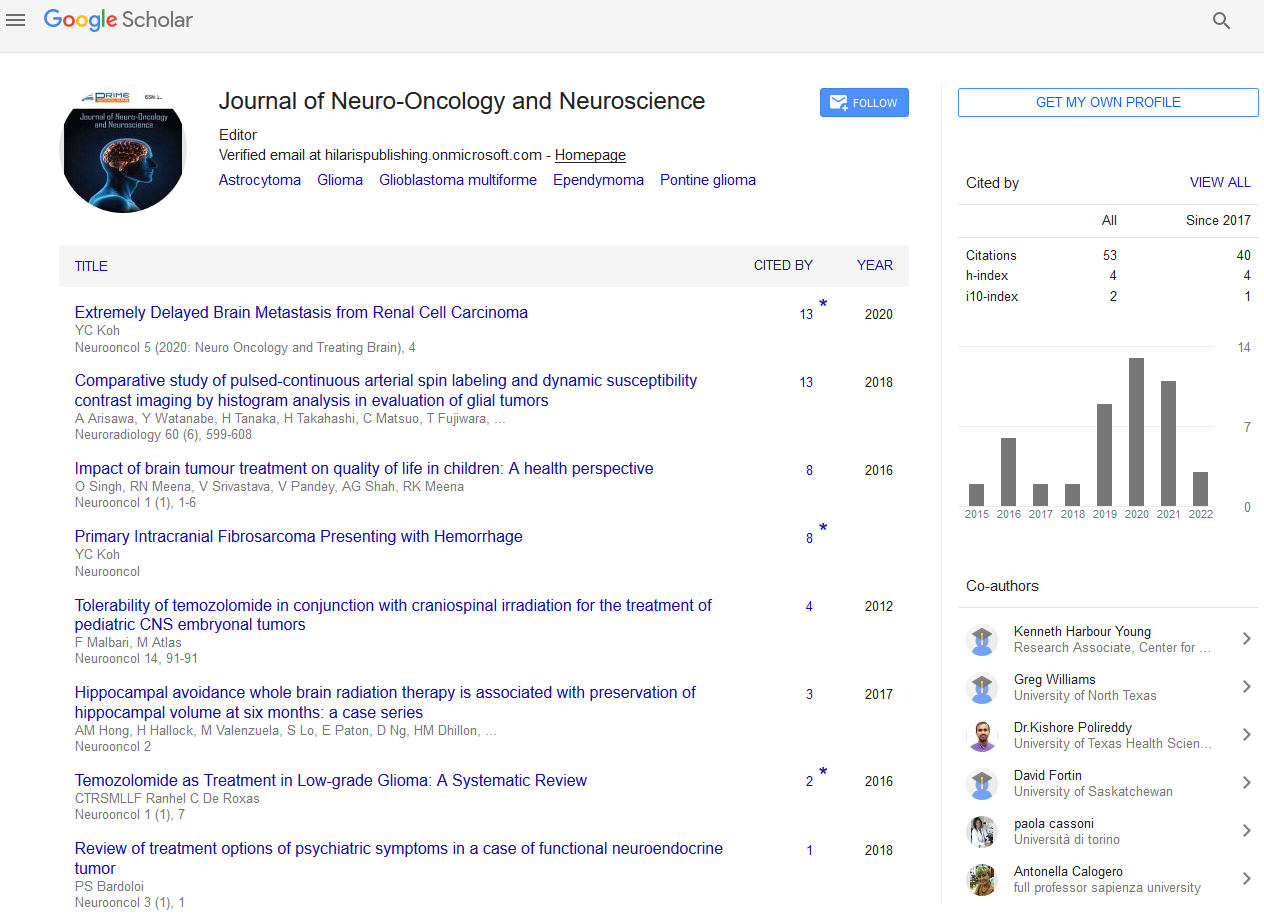Perspective Article - (2023) Volume 8, Issue 3
Providing Holistic Care: The Role of Neuro-oncology Nursing for Patients and Families
Vincent Leitzmann*
Department of Oncology, Odense University Hospital, Denmark
*Correspondence:
Vincent Leitzmann,
Department of Oncology, Odense University Hospital,
Denmark,
Email:
Received: 30-Aug-2023, Manuscript No. IPJNO-24-19613;
Editor assigned: 01-Sep-2023, Pre QC No. IPJNO-24-19613 (PQ);
Reviewed: 15-Sep-2023, QC No. IPJNO-24-19613;
Revised: 20-Sep-2023, Manuscript No. IPJNO-24-19613 (R);
Published:
27-Sep-2023, DOI: 10.21767/2572-0376.8.3.28
Introduction
Neuro-oncology nursing stands at the forefront of providing
comprehensive and compassionate care to patients and
families are facing the daunting challenges of brain tumors.
As integral members of the multidisciplinary healthcare team,
neuro-oncology nurses play a vital role in supporting patients
throughout their journey, from diagnosis to survivorship or endof-
life care. By addressing the physical, emotional, social, and
spiritual needs of patients and their families, neuro-oncology
nurses contribute to enhancing quality of life and promoting
holistic well-being in the face of a devastating diagnosis. One
of the primary responsibilities of neuro-oncology nurses is to
facilitate effective communication and education, empowering
patients and families to make informed decisions about their
care. From explaining treatment options and managing side
effects to providing resources and support, nurses serve as
advocates and educators, ensuring that patients have the
knowledge and tools they need to navigate the complexities
of their illness. Additionally, neuro-oncology nurses provide
ongoing emotional support and counseling, helping patients
and families cope with the psychological impact of a brain
tumor diagnosis and treatment.
Description
In addition to addressing the physical and emotional aspects
of care, neuro-oncology nurses play a crucial role in symptom
management and supportive care. Brain tumors and their
treatment can lead to a wide range of symptoms, including
pain, fatigue, cognitive impairment, and neurological deficits.
Nurses assess and monitor these symptoms, implement
evidence-based interventions, and collaborate with the
healthcare team to optimize symptom control and enhance
patient comfort. Palliative care and symptom management
strategies are integral components of neuro-oncology nursing
practice, ensuring that patients receive compassionate and
holistic care throughout their illness trajectory.
Another essential aspect of neuro-oncology nursing is end-oflife
care and bereavement support for patients and families
facing the terminal stages of the disease. Nurses provide
compassionate and dignified care to patients nearing the
end of life, focusing on symptom management, comfort, and
quality of life. They also offer support and guidance to families
as they navigate the complex emotions and practicalities
associated with end-of-life care and bereavement. Spiritual
care and counseling are integral components of this process,
addressing the existential and existential needs of patients
and families as they confront mortality and loss. In addition
to direct patient care, neuro-oncology nurses contribute to
advancing the science and practice of neuro-oncology nursing
through research, education, and advocacy. By participating
in research studies, presenting at conferences, and publishing
scholarly articles, nurses contribute valuable insights and
evidence-based practices to improve patient outcomes and
enhance the quality of care.
Conclusion
Neuro-oncology nursing plays a critical role in providing
holistic care for patients and families affected by brain
tumors. Through compassionate communication, symptom
management, supportive care, and end-of-life care, nurses
address the physical, emotional, social, and spiritual needs
of patients throughout their illness trajectory. By fostering
partnerships with patients, families, and the healthcare team,
neuro-oncology nurses promote dignity, autonomy, and quality
of life in the face of a challenging diagnosis. Through their
dedication, expertise, and compassion, neuro-oncology nurses
make a profound difference in the lives of those affected by
brain tumors, offering support, comfort, and hope in the midst
of uncertainty.
Citation: Leitzmann V (2023) Providing Holistic Care: The Role of Neuro-oncology Nursing for Patients and Families. Neurooncol. 8:028.
Copyright: © 2023 Leitzmann V. This is an open-access article distributed under the terms of the Creative Commons Attribution License, which permits unrestricted use, distribution, and reproduction in any medium, provided the original author and source are credited.

